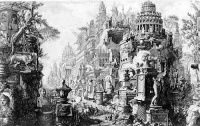Legacy of the Roman Empire
From The Art and Popular Culture Encyclopedia

Illustration: Antichita Romanae (1748) by Piranesi
|
Related e |
|
Featured: |
The legacy of the Roman Empire includes the set of cultural values, religious beliefs, the technological advancements, and other achievements of Ancient Rome. This legacy was passed on after the demise of the empire itself and continued to shape other civilizations, a process which continues to this day. The city of Rome was the civitas (reflected in the etymology of the word "civilization") and consequently the actual western civilization on which subsequent cultures built.
The Latin language of ancient Rome, epitomized by Classical Latin used in Latin literature, evolved during the Middle Ages and has been utilized ever since by the Roman Catholic Church for Ecclesiastical Latin. Vulgar Latin, the common tongue used for regular social interactions, evolved simultaneously into the Romance languages that exist today (e.g. Italian, French, Spanish, Portuguese, Romanian, etc.). Although the Western Roman Empire fell in the 5th century AD, the Eastern Roman Empire continued until its conquest by the Ottoman Empire in the 15th century AD and cemented the Greek language in many parts of the Eastern Mediterranean even after the Early Muslim conquests of the 7th century AD. Although there has been a small modern revival of the Hellenistic religion with Hellenism, ancient Roman paganism was largely displaced by Christianity after the 4th century AD and the Christian conversion of Roman emperor Constantine I (r. 306-337 AD). The Christian faith of the late Roman Empire continued to evolve during the Middle Ages and is still a major facet of the modern Western world.
Ancient Roman architecture, largely indebted to ancient Greek architecture of the Hellenistic period, has made a consistent impact on the architecture of the Western world, particularly during the Italian Renaissance of the 15th century. Roman law and republican politics (from the age of the Roman Republic) have left an enduring legacy, influencing the city-state republics of the Medieval period as well as the early United States and other modern democratic republics. The Julian calendar of ancient Rome formed the basis of the Gregorian calendar in the West, while Roman inventions and engineering, such as the construction of concrete domes, continued to influence various peoples after the fall of Rome.
See also
- Western Roman Empire
- Byzantine Empire
- Legacy of Byzantium
- Third Rome
- Eastern Romance substratum
- Origin of the Romanians
- Classical Antiquity
- History of the Roman Empire
- Western Roman Empire

